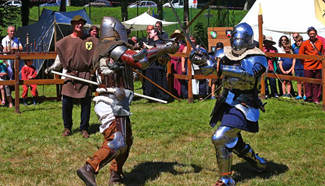LONDON, Aug. 8 (Xinhua) -- The University of Oxford Monday announced that its researchers had achieved a quantum logic gate with record-breaking 99.9 percent precision, reaching the benchmark required theoretically to build a quantum computer.
The team achieved the logic gate, which places two atoms in a state of quantum entanglement and is the fundamental building block of quantum computing, with a precision substantially greater than the previous world record, according to the university.
Quantum entanglement is a phenomenon that occurs when two particles stay connected, such that an action on one affects the other, even when they are separated by great distances. This mechanism is at the heart of quantum technologies.
"The precision of the gate is a measure of how well this works: in our case, 99.9 percent precision means that, on average, 999 times out of 1,000 we will have generated the entangled state correctly, and one time out of 1,000 something went wrong," said Professor David Lucas from the University of Oxford, who is one of the authors of the study.
Quantum computers, which function according to the laws of quantum physics, have the potential to dwarf the processing power of today's computers, able to process huge amounts of information all at once.
A quantum computer is a machine that processes information according to the rules of quantum physics, which govern the behavior of microscopic particles at the scale of atoms and smaller, said Dr Chris Ballance from the University of Oxford, another author of the study.
Quantum technology is a complex area, but one analogy that has been used to explain the concept of quantum computing is that it is like being able to read all of the books in a library at the same time, whereas conventional computing is like having to read them one after another, according to the University of Oxford.
"Achieving a logic gate with 99.9 percent precision is another important milestone on the road to developing a quantum computer. A quantum logic gate on its own does not constitute a quantum computer, but you can't build the computer without them," said Professor Lucas.
The study is carried out by researchers from the Networked Quantum Information Technologies Hub, which is led by the University of Oxford, and has been published in the journal Physical Review Letters.










